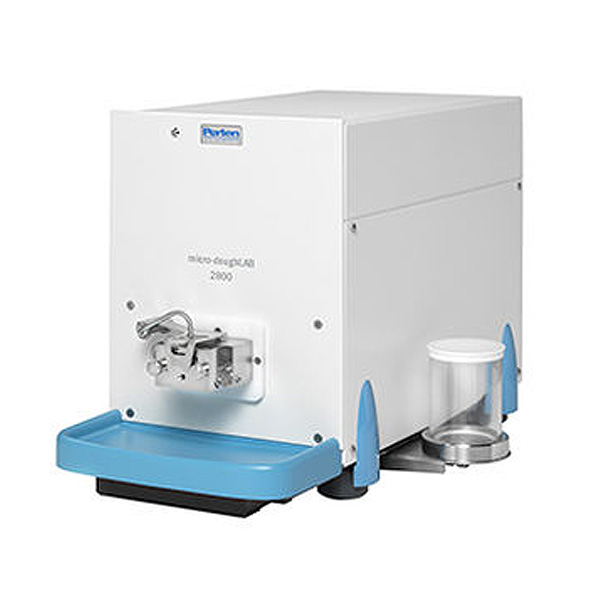micro-doughLAB
The micro-doughLAB is a small scale (4g) dough mixer and analysis system to determine the quality and processing characteristics of flour and dough.
The small sample size is ideal for researchers, wheat breeders, grain handlers, millers and bakers with the limited sample and/or valuable samples.
It can be used to screen breeder lines, develop rapid and small scale methods and to establish the performance, specification, water and mixing requirements of flour. It enables users to save time and money by accurately and quickly identifying the best flour for their application.
The micro-doughLAB uses doughLAB for Windows (DLW) software. It is easy to use, compact, reproducible, accurate and cleans up quickly.
Features and benefits
micro-doughLAB:
Small Sample Size: Integrated 4g micro scale bowl.
Fast: High-energy mixing for high-throughput testing
Variable Speed & Temperature: To study dough performance during heating, cooling and gelling/cooking. Variable speed mixing to study stiff and crumbly doughs, novel formulations, evaluate dough response to changing stress and mimic commercial mixing.
Automated: Integrated bowl temperature control system. Integrated automatic water dispensing.
Easy Clean Up: Bowl disassembles quickly for easy cleaning to increase sample throughput.
doughLAB for Windows (DLW) Software:
Calibration: Traceable software calibration procedure.
User-Friendly: Methods included in the software library. Easy to use “routine user” mode. Software password protection.
Programmable Instrument Control: “Profile” style method set up with advanced options and for flexibility and ease of use
Flexible Data Analysis: Auto functions for commonly derived parameters and advanced functions for research.
Real-Time Graph Display: Interactive and overlay functions for clarity.
Single Page Report: Traceability data, results and the graph all on a single page.
Traceability: complies with ER/ES (electronic records/electronic signatures) requirements for data security.
Virtual blending: View, chart, average, and analyze data to predict the performance of flour blends.
Operation and handling
The micro-doughLAB is a small-scale sigma arm dough mixer which requires 4g of flour and measures water absorption (WA) and dough mixing parameters.
The small sample requirement makes micro-doughLAB well suited for use by wheat breeders and researchers who typically have limited sample available. It can be used to develop rapid and small scale methods that correlate to standard methods.
|
|
|
|
|
1) Open the appropriate micro-doughLAB method in DLW software. Accurately weigh your flour sample using an electronic balance. |
2) Raise the safety from the bowl. |
3) Dispense the flour sample into the bowl, as shown. |
|
|
|
|
|
4) Lower the safety lid back into place above the bowl and ensure the dispensing arm is positioned over the bowl. Click on “Run” The flour sample will be mixed for the specified zero time. Water will then be added to the sample. |
5) Place the evaporation lid over the bowl. |
6) The resistance of the dough will be graphed on the monitor. |
Applications
Wheat flour doughs are nonlinear viscoelastic materials, and as such, there is a complicated relationship between the strains imparted during mixing (stretching, shearing, compression, and relaxation) and dough resistance. A number of factors related to processing conditions and flour type will also have a large effect on how the dough behaves. Variations in water and protein content, changes in the fibrillar structure of the protein, starch, starch damage, pentosans, gluten strength and the actions of enzymes on the dough components all affect dough behavior. Due to the complex nature of dough behavior an empirical instrument test is desirable.
The two key pieces of information required by millers and bakers are the absorption (amount of water required for dough to reach a definite consistency) and the mixing profile of the dough (development time, stability and softening) which are indicative of the suitability of the flour for different applications. Other parameters may also be measured.
micro-doughLAB information will be useful to:
- Wheat breeding laboratories developing new lines for milling, baking (bread, cake, pastry, biscuit), pasta and Asian products (eg steam bread, noodles, and flatbread), who need to test wheat flour quality and processing characteristics using small samples (F4 and possibly F3 stage). micro-doughLAB can also be used to develop rapid and small scale methods that correlate to standard methods.
- Flour Millers producing flour that meets the customers’ specification, establishing the performance of new season wheat, mixing and blending old wheat with new in order to meet the specifications, developing flour blends that are optimized for processes, establishing the specification of incoming flour, developing new products and studying gluten characteristics. micro-doughLAB offers high sample throughput, fast tests, convenient handling, and commercial process emulation routines.
Specifications
|
General |
|
|
Power Requirements: |
AC 115/230 V ± 10% 50/60 Hz, 500 VA. |
* Low temperature down to 5°C, but can only be 15 °C below supplied coolant temperature.


